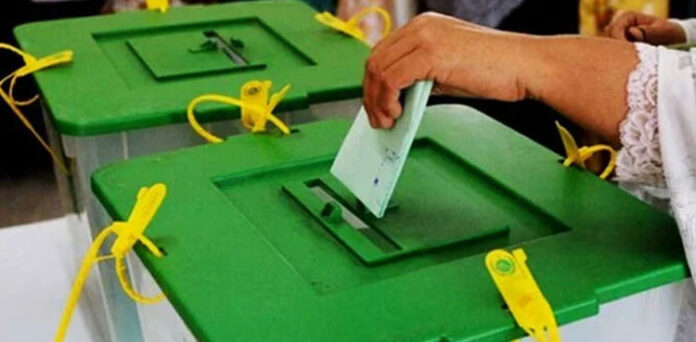ISLAMABAD, : Free and fair elections, through inclusivity, accountability and transparency, are fundamental in democracy, ensuring the rule of law and enabling people to have a final say in decision-making and state affairs.
The legitimacy of democracy, in any form, is rooted in the support and will of people to an extent where people firmly believe that their will is respected through a transparent process in vote casting and counting processes.
Within an atmosphere of elections that uphold freedom and fairness, a multitude of voices can actively participate in the political process. This inclusiveness not only strengthens democratic institutions but also reflects the diverse tapestry of beliefs and ideologies within the country.
Ensuring the significance of each vote, Pakistan can pave the way for a just and prosperous society where the rule of law is ensured, people will take precedence, the constitution fully adheres and democratic institutions enjoy full liberty.
Globally, the conduct of free and fair elections contributes to elevating Pakistan’s standing and cultivating trust with its international partners. It showcases the nation’s dedication to democratic principles and human rights.
Establishing and fortifying democratic processes and institutions is a shared duty of the governments, the electorate, political entities and other state stakeholders.
Genuine and periodic elections are vital for safeguarding the rights and interests of the people. The practical experience underscores that everyone’s right to participate in their country’s government is crucial for the effective enjoyment of fundamental freedoms.
Civil society organizations and the media are pivotal in overseeing elections and guaranteeing their fairness. This section underscores their contributions and stresses the importance of maintaining their independence.
By fostering transparent electoral processes, elected officials are held accountable for their actions. This accountability is instrumental in combating corruption and ensuring that the government operates for the benefit of all citizens, rather than a select few.
Keeping in view the vitality of electioneering and electoral process, the Election Commission of Pakistan (ECP) is putting in sincere efforts to guarantee free, fair and undisputed elections in the country.
Prime Minister Anwaar ul Haq Kakar’s recent meeting with Chief Election Commissioner (CEC) Sikandar Sultan Raja also reflected their dedication to ensuring free and fair elections.
“The ECP and its nationwide election officials, poll workers and volunteers are committed to diligently ensuring a smooth and transparent election process,” said an official of the Election Commission. “We are completing preparations to ensure that the core of democracy rests on the representation of people where each vote is acknowledged and tallied.”
He mentioned conducting various awareness sessions, especially with the students by the ECP in collaboration with the Pakistan Institute of Legislative Development and Transparency (PILDAT) and the United Nations Development Program (UNDP) since November 2021.
So far 707 students’ orientation sessions have been conducted besides 34 media workshops facilitated by the ECP’s Media Coordination and Outreach Wing (MCO) in collaboration with key civil society organizations.
These sessions involved a diverse array of participants, spanning women, minorities, transgender individuals, people with disabilities, academia, bloggers, volunteer students and local print and electronic media.
Around 26,000 voter education brochures were dispatched to Balochistan, 100,000 to Sindh and 30,000 to Khyber Pakhtunkhwa for the awareness of the general public.
In the preparations process, the ECP initiated an SMS service to check vote status by sending CNIC number to 8300 or verification through the District Election Commissioner’s office in their area, delimitation of constituencies is being finalized for official release on November 30.
The ECP is also set to enlist over one million individuals for the polling process as a list of Presiding Officers, Assistant Presiding Officers and polling staff is being finalized for nationwide deployment.
Like always, the ECP has also finalized the code of conduct for international observers and is engaged with Meta and Facebook to explore strategies for raising awareness about the electoral processes.
Both organizations engaged in fruitful discussions that encompassed translating Facebook community standards into Urdu and regional languages to address societal polarization.
Since, a stereotype preparations module for the conduct of elections is revealed by the ECP prior to each election, yet the challenge with this office remains as to how to make the elections credible as we have a checkered history of election results.
It is very rare that all political parties accept the results with open hearts. No matter, there can also be political ill will of these parties but at least the Election Commission should ensure that no figure is raised towards it.
Furthermore, in this age of digital and social media when it is difficult to hide information like the past, the ECP must have to set its course keeping in mind the use of the latest gadgets for the flow of information about electioneering and declaration of results.
As feudalism, caste, and community culture is deeply entrenched in our society, there would also be a need to address the issues like influencing the voters and polling staff by force.
All types of rigging and engineering elections must also be taken care of just to set an example of holding free, fair, and transparent elections and to address the menace of election rigging once and for all.



Comments are closed.